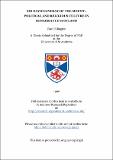Files in this item
Sir David Lindsay of the Mount : political and religious culture in Renaissance Scotland
Item metadata
| dc.contributor.author | Edington, Carol | |
| dc.coverage.spatial | 461 p. | en_US |
| dc.date.accessioned | 2018-07-06T08:04:11Z | |
| dc.date.available | 2018-07-06T08:04:11Z | |
| dc.date.issued | 1992-07 | |
| dc.identifier.uri | https://hdl.handle.net/10023/15022 | |
| dc.description.abstract | For too long Sir David Lindsay of the Mount has been almost the exclusive concern of literary critics and ecclesiastical historians. This thesis aims to demonstrate that Lindsay and his works represent an invaluable source for a much broader study of Renaissance Scotland and that placing each in a proper historical and cultural context sheds an important light on some of the ideas and attitudes which shaped Scotland's political and religious culture during this crucial period. The thesis falls into three sections. The first offers a detailed examination of Lindsay's career, tracing his arrival at Court, his experiences during the minority of 1513-28 and his employment as a herald. Looking at the events of the 1530s, it argues that Lindsay's position is best seen both in the light of a developing humanist- influenced court culture and the emergence of religious controversy. It is suggested that, following the death of James V, Lindsay was much less closely associated with the Court and that this had important consequences for his political, religious and poetic development. Part Two stresses the hitherto little appreciated point that Lindsay was very much a political writer. Analysing his discussion of government, the section looks in particular at ideas of kingship and commonweal, assessing the extent to which Lindsay variously questioned or endorsed traditional attitudes and assumptions. This also involves a study of Lindsay's position as court-poet and those occasions of public spectacle with which he was involved. Completing the examination of Lindsay and his works, the thesis turns to questions of religion. Arguing that his work represents a more complex, often more ambiguous, but ultimately more satisfying, source than is generally appreciated. Part Three considers Lindsay's religious attitudes, examining what his poetry can tell us concerning the situation in Scotland on the eve of the Reformation. | en_US |
| dc.language.iso | en | en_US |
| dc.publisher | University of St Andrews | |
| dc.subject.lcc | PR2659.L5Z5E3 | |
| dc.subject.lcsh | Lindsay, David, Sir, fl. 1490-1555 | en |
| dc.subject.lcsh | Renaissance--Scotland | en |
| dc.subject.lcsh | Religion in literature--History--16th century | en |
| dc.title | Sir David Lindsay of the Mount : political and religious culture in Renaissance Scotland | en_US |
| dc.type | Thesis | en_US |
| dc.type.qualificationlevel | Doctoral | en_US |
| dc.type.qualificationname | PhD Doctor of Philosophy | en_US |
| dc.publisher.institution | The University of St Andrews | en_US |
This item appears in the following Collection(s)
Items in the St Andrews Research Repository are protected by copyright, with all rights reserved, unless otherwise indicated.

